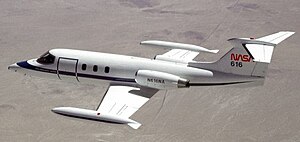Learjet 25: Difference between revisions
m r2.7.1) (robot Adding: ru:Learjet 25 |
|||
| Line 75: | Line 75: | ||
;{{USA}} |
;{{USA}} |
||
*[[NASA]] |
*[[NASA]] |
||
* [http://www.MicroJetNetwork.com ] Micro Jet Network offers some of the finest refurbished Lear 25's in existence today. |
|||
==Specifications (Learjet 25D)== |
==Specifications (Learjet 25D)== |
||
Revision as of 15:23, 8 February 2011
| Learjet 25 | |
|---|---|

| |
| NASA Learjet 25 | |
| Role | Business jet |
| Manufacturer | Learjet |
| First flight | August 12, 1966 |
| Introduction | November 1967 |
| Developed from | Learjet 24 |
| Variants | Rocketplane XP |
| Developed into | Learjet 28 |
The Learjet 25 is an American ten seat (two crew and eight passengers) twin-engined, high speed business jet aircraft. Manufactured by Learjet as a stretched version of the Learjet 24.
Development
The first Model 25 flew on August 12, 1966, and the first delivery was in November 1967.[1]
The Learjet 25 is similar to the Model 24 but is 1.27 m (4 ft 2 in) longer, allowing for three additional passengers. In 1970 the Learjet 25B was produced along with the Learjet 25C in the same year.
The aircraft has two General Electric CJ610-6 (or CJ610-8) turbojet engines. Baggage is stowed in a compartment at the rear of the cabin.
Operations
The cabin interior can be converted to several different configurations to allow for cargo and medevacs. Due to the ease of converting the cabin the Learjet 25 has found a niche as a medevac aircraft. This is achieved by removing the starboard seating to allow for a stretcher, mounting oxygen bottles and Intravenous drip equipment. The two flight crew are then supplemented by either a doctor or flight nurse or both. The Model 25C also has an optional two bed sleeping compartment.
Despite being used at lower altitudes and equipped with small landing gear, the Learjet can land on gravel runways if it is fitted with a special "gravel kit". It is possible for gravel from an improperly packed gravel runway to be sucked into the engines causing "Foreign object damage", thus the need for the kit.



In 1974 the Peruvian Air Force purchased two 25Bs with a belly pod that contained an aerial survey camera.
Variants
The ICAO designator as used in flight plans for all Learjet 25 models is LJ25.
Learjet 25A
FAA certified on October 10, 1967.
Learjet 25B
Improved version. FAA certified on September 4, 1970.
Learjet 25C
Improved version with greater fuel capacity. FAA certified on September 4, 1970.
Learjet 25D
Longer-range version.
Learjet 26
Unofficial designation of a Model 25 which was equipped with Garret AiResearch TFE731-2 turbofan engines for a developmental flight test program. The aircraft, N26GL, first flew with the engines on May 19, 1971. The success of the flights led to the development of the Model 35.[1]
Learjet 25G
Introduced September 23, 1980. During a series of demonstration flights lasting from June 9 to 18, 1982, the 25G broke a number of long-distance speed and fuel consumption records.[1]
Operators
Military operators
Specifications (Learjet 25D)
Data from Jane's All The World's Aircraft 1976–77[2]
General characteristics
- Crew: Two pilots
- Capacity: 8 passengers
Performance
See also
Related development
Related lists
References
- ^ a b c Learjet company timeline
- ^ Taylor 1976, pp. 283–285.
- Taylor, John W. R. Jane's All The World's Aircraft 1976–77. London:Jane's Yearbooks, 1976. ISBN 0 354 00538 3.
